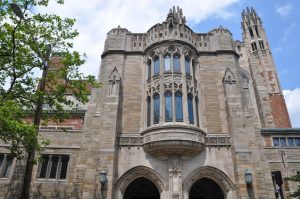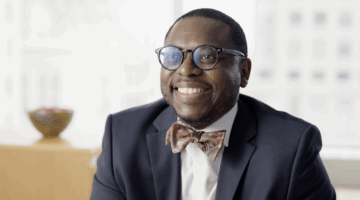
What is going on inside the Yale Law School clerkship process, and when will they tell us?
As reported in the Guardian this morning, Yale Law School is conducting an internal investigation into professor Jed Rubenfeld.
Rubenfeld is important to the national conversation right now because he, along with his wife and Yale Law clerkship committee member Amy Chua, have told a number of women Yale Law students that Judge Brett Kavanaugh prefers clerks with “a certain look.” They do not appear to be talking about mere sartorial comportment, as Chua reportedly said it’s “no accident” that Kavanaugh’s clerks “look like models.” Rubenfeld apparently warned a student to avoid working for two judges: Alex Kozinski, and Brett Kavanaugh. We now know why Kozinski was a problem. What do Rubenfeld and Chua know about Brett Kavanaugh that puts him in the same category of judges to avoid?

How The Law Office Of Stephen L. Thomas Jr. Reclaimed Valuable Hours And Strengthened Client Care With 8am
Founded in 2017, the Baltimore-based Law Office of Stephen L. Thomas Jr. unified case management, communication, and payments with 8am—saving 10–20 hours a week for clients, trials, and growth.
But, that is the White House’s problem now. Yale Law School’s problem is that they’ve got two professors running around offering wildly inappropriate “advice.”
And apparently the school’s been worried about Jed Rubenfeld for some time.
We can now report that Yale has been conducting an internal investigation into harassment and inappropriate conduct allegations concerning Professor Rubenfeld. The law school will neither confirm nor deny the existence of the investigation, but a letter that went out to Yale Law School Alumni over the summer confirms that the investigation is ongoing.
“YLS has hired an outside investigator to look into Professor Rubenfeld’s conduct, and folks should reach out to her if they have something to share. The sooner the better, and it’s possible to talk to her in ways that preserve anonymity (see details below). The investigator’s name is Jenn Davis, and she can be reached at: [Redacted]
More details:
YLS seems to be pretty concerned about what it’s been hearing about Professor Rubenfeld’s conduct, especially (but not solely) with respect to female students. This is conduct that seems to date back decades but that has persisted into the just-concluded school year. YLS has hired an outside investigator, Jenn Davis, to try to put together a more comprehensive account of that conduct and its effects on the environment at YLS. One Dean Gerken receives this account, a determination will be made about what steps to take with respect to remedies.
Scope and process: Jenn’s jurisdiction is over issues regarding female students as well as other types of behaviors that have given rise to concern over the years. It seems she’s been tasked with understanding whether Professor Rubenfeld contributes to a hostile environment for students, generally. There is an understanding that certain behaviors might well not be unique to him or to YLS, but that does not make them OK.
More specifically, it seems Jenn is interested in hearing about, among other things:
· Disparate treatment of, or boundary crossing with, women in the YLS community. She is interested in hearing from subjects of, or witnesses to, that treatment. (E.g., comments about female students’ physical appearances or relationship histories, conversations that seem designed to “test the waters,” intimidation or efforts at manipulation targeted at female students, etc.).
· Conduct related to excessive drinking with students (driving with students while drunk, etc.).
· Inappropriate employment practices relating to RAs or Coker Fellows.
· Retaliation against students who do not show sufficient loyalty.
Anonymity: YLS has given Jenn permission to talk to individuals (students, alums, etc.), and to record (or not) what they have to say, at whatever level of anonymity the individuals feel comfortable with. There are opportunities to aggregate accounts, to speak completely off the record, etc. Obviously, the more detail that Jenn can ultimately pass along, the more useful her report will be, but any accounts that help her get a better sense of the environment at YLS will add value. If you are interested in reaching out to her, you can set up a preliminary call just to talk about procedure, if you would like. You can also change your mind at any point about the level of anonymity at which you provide information; she has said that even for people who agree to have their name or identifying information used, she will circle back to confirm before sharing it. There is enormous flexibility here. That said, the one thing Jenn cannot offer is attorney-client privilege; if her records are ultimately subpoenaed, she could fight the subpoena, but can’t guarantee she would win.
Jenn herself: She has worked on investigations at graduate and undergraduate programs at peer schools, and she seems to recognize the complexities of, and common dynamics within, these types of environments. [Redacted] has spoken with her already and would be happy to speak with anyone who wants to know more.

Ready for What’s Next: 5 Ways to Strengthen Economic Resilience
Get five practical tips to spot cash flow red flags early, speed up payments, track spending in real time, and build stronger client trust through clear, transparent billing—download the ebook.
Yale would not confirm or deny the existence of this investigation to Above the Law. A spokesperson told us: “We cannot confirm or deny the existence of an investigation. I can assure you that we take allegations of faculty misconduct very seriously.”
But in the Guardian, Jed Rubenfeld did confirm the investigation:
In June, Yale University informed me that it would conduct what it terms an “informal review” of certain allegations, but that to preserve anonymity, I was not entitled to know any specifics. As a result, I do not know what I am alleged to have said or done. I was further advised that the allegations were not of the kind that would jeopardize my position as a long-tenured member of the faculty.
For some years, I have contended with personal attacks and false allegations in reaction to my writing on difficult and controversial but important topics in the law. I have reason to suspect I am now facing more of the same. While I believe strongly that universities must conduct appropriate reviews of any allegations of misconduct, I am also deeply concerned about the intensifying challenges to the most basic values of due process and free, respectful academic expression and exchange at Yale and and around the country.
Nevertheless, I stand ready to engage with this process in the hope that it can be expeditiously concluded.
I fail to see how “Conduct related to excessive drinking with students (driving with students while drunk, etc.),” falls in the category of “controversial but important topics in law.” The allegations against Rubenfeld outlined in this email go well beyond anything that can be described as retaliation for academic beliefs. I’m also not sure that hiring Jenn Davis, a Title IX investigator, qualifies as an “informal review,” but we also don’t know exactly how forthcoming Yale Law School has been with Rubenfeld about the allegations against him.
Moreover, Yale Law alumni tell us that Rubenfeld’s behavior towards women was an “open secret” within the Yale Law community. The allegations of “boundary crossing” mentioned in the email have been repeated to us via anonymous emails, texts, and DMs from alumni that are known to us but do not want to go on the record until the investigation is complete. There are even public tweets which seem to speak to these matters, if you know what you are looking for.
There are also questions surrounding Professor Amy Chua. The email suggests an investigation into possible retaliation for insufficient “loyalty,” which would reasonably have to include an inquiry into whether or not the clerkship process was compromised. This is, of course, unrelated to the Kavanaugh comments currently at issue. On that aspect, a Yale Law School spokesperson would only tell us this:
This is the first we have heard claims about Professor Chua’s advice to students. We will look into these claims promptly, taking into account the fact that Professor Chua is currently unreachable due to serious illness. If true, this advice is clearly unacceptable.
Again, Professor Chua does not denying saying to students what she said about Kavanaugh.
The advice given by Professor Amy Chua to students — in her role of advising students on how to secure clerkships — appears to be wildly inappropriate. The allegations against her husband, Professor Jed Rubenfeld, appear to be serious. And yet as of this moment, all Professor Chua has done is… defend Brett Kavanaugh. This was her statement to the Guardian:
For the more than 10 years I’ve known him, Judge Kavanaugh’s first and only litmus test in hiring has been excellence. He hires only the most qualified clerks, and they have been diverse as well as exceptionally talented and capable.
Yale Law School is the most important law school in the country for identifying and grooming new federal judges and a federal clerkship is the key credential for starting down that career path. Amy Chua has been involved with that clerkship process at Yale for ten years. She has been one of the most powerful people in the country for making new judges.
Maybe before deploying the law school’s reputation in defense of a Supreme Court nominee, Yale needs to clean up its own yard?
But since Yale is determined to defend Kavanaugh at all costs, it is fair to ask: What does Yale know about Kavanaugh that they are not telling the rest of us? What does Rubenfeld know? What does Chua know? And will anybody on the Senate Judiciary Committee bother to ask them?
UPDATE: Yale Law School Dean Heather Gerken has sent out the below email in response to the swirling controversy:
To Members of the Yale Law School Community:
I want to address the press reports today regarding allegations of faculty misconduct.
The allegations being reported are of enormous concern to me and to the School. While we cannot comment on individual complaints or investigations, the Law School and the University thoroughly investigate all complaints regarding violations of University rules and take no options off the table. Neither the Law School nor the University prejudges the outcomes of investigations. Any statements to the contrary are inaccurate.
The Law School has a responsibility to provide a safe environment in which all of our students can live and learn in a community of mutual respect, free of harassment of any kind. I take this responsibility extraordinarily seriously.
I strongly encourage any members of our community who have been affected by misconduct to take advantage of Yale University’s resources for reporting incidents and receiving support, which are listed here. You should also reach out to Associate Dean Ellen Cosgrove.
Faculty misconduct has no place at Yale Law School. You have my word that we will take appropriate action on any complaints.
Sincerely,
Dean Heather Gerken
Elie Mystal is the Executive Editor of Above the Law and the Legal Editor for More Perfect. He can be reached @ElieNYC on Twitter, or at [email protected]. He will resist.